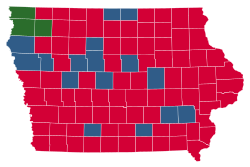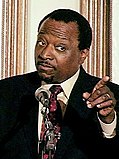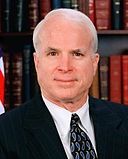2000 Iowa Republican presidential caucuses
| ||||||||||||||||||||||||||||||||||||||||||||||||
30 unpledged Republican National Convention delegates | ||||||||||||||||||||||||||||||||||||||||||||||||
|---|---|---|---|---|---|---|---|---|---|---|---|---|---|---|---|---|---|---|---|---|---|---|---|---|---|---|---|---|---|---|---|---|---|---|---|---|---|---|---|---|---|---|---|---|---|---|---|---|
| ||||||||||||||||||||||||||||||||||||||||||||||||
 Iowa results by county George W. Bush Steve Forbes Gary Bauer | ||||||||||||||||||||||||||||||||||||||||||||||||
| Elections in Iowa |
|---|
 |
The 2000 Iowa Republican presidential caucuses took place on January 24, 2000. The Iowa Republican caucuses are an unofficial primary, with the delegates to the state convention selected proportionally via a straw poll.[1] The Iowa caucuses marked the traditional formal start of the delegate selection process for the 2000 United States presidential election.[2]
Background
The 2000 election cycle marked the first open Republican presidential primary since 1996, following two terms of Democratic President Bill Clinton. The Republican field was notably crowded, with several prominent candidates vying for the nomination.[3] Texas Governor George W. Bush entered the race as the presumptive frontrunner, having secured significant party establishment support and unprecedented early fundraising success, raising over $37 million by mid-1999.[4]
Bush faced competition from several experienced politicians and businesspeople. Steve Forbes, the publisher of Forbes magazine, launched his second presidential campaign after his unsuccessful 1996 bid, focusing heavily on his proposal for a flat tax.[5] Gary Bauer, the former president of the Family Research Council, positioned himself as a champion of social conservatives and the pro-life movement.[6]
Campaign activity
The months leading up to the caucuses saw intense retail campaigning across Iowa's 99 counties. Bush's campaign emphasized his record as Texas governor, particularly his work on education reform and tax cuts, while promoting his philosophy of "compassionate conservatism."[7] His campaign built an extensive ground operation, led by future Republican National Committee chairman Ken Mehlman, which focused on identifying and turning out likely supporters.[8]
Forbes invested heavily in television advertising across the state, spending millions from his personal fortune to promote his economic agenda.[9] His campaign particularly emphasized opposition to the Internal Revenue Service and support for school choice. The Forbes campaign also built a sophisticated voter identification system, attempting to replicate the success of his second-place finish in the 1996 Iowa caucuses.[10]
The Ames Straw Poll
The 2000 Ames straw poll was held at Iowa State University's Hilton Coliseum on August 14, 1999. The event served as a major fundraiser for the Iowa Republican Party, with participants required to purchase $25 tickets to participate.[11] Campaigns typically purchased large blocks of tickets and provided free transportation to supporters, making the event as much a test of organizational strength as voter preference.[12]
Results and Impact
George W. Bush secured a convincing victory with 31% of the vote, helped by superior organization and the enthusiasm of Iowa Republicans for his candidacy.[13] Steve Forbes finished second with 21%, demonstrating that his message continued to resonate with fiscal conservatives. Elizabeth Dole, the former Red Cross president and wife of 1996 Republican nominee Bob Dole, placed third with 14%, but the performance failed to provide the momentum her campaign needed.[14]
The results had immediate consequences for the Republican field. Lamar Alexander, former governor of Tennessee, withdrew from the race two days after his sixth-place finish.[15] Dan Quayle, the former vice president, saw his campaign severely weakened by a disappointing eighth-place showing.[16]
January 2000 procedure
The Republican caucus process differed significantly from its Democratic counterpart in both rules and execution.[17] While Democrats used a complex system of preference groups and realignment, Republicans employed a straightforward straw vote system that more closely resembled a traditional primary election.[18]
Caucus meetings took place in approximately 2,000 precincts across Iowa's 99 counties.[19] Party rules required all caucus locations to be accessible to persons with disabilities and provide adequate parking, in compliance with the Americans with Disabilities Act.[20]
Voting Process
Each caucus began with the election of temporary officers, including a chairperson and secretary.[21] Representatives of campaigns were allowed to make brief speeches on behalf of their candidates, typically limited to two minutes each per party rules.[22]
The actual voting process was notably simple: participants received blank pieces of paper and wrote down their preferred candidate's name.[23] Results were tallied at each precinct and reported to Republican Party headquarters in Des Moines via a dedicated phone system established specifically for the caucuses.[24]
Results of the January 2000 caucuses
Final Results
The final results showed George W. Bush winning with 41% of the vote, followed by Steve Forbes with 30.5%, and Alan Keyes with 14.2%.[25] Total turnout reached 87,666 participants, down from 109,000 in 1996.[26]
| Candidate | Votes[27] | Percentage | Delegates[28] |
|---|---|---|---|
| George W. Bush | 35,948 | 40.99% | 10 |
| Steve Forbes | 26,744 | 30.50% | 8 |
| Alan Keyes | 12,496 | 14.24% | 4 |
| Gary Bauer | 7,487 | 8.53% | 2 |
| John McCain | 4,093 | 4.67% | 1 |
| Orrin Hatch | 898 | 1.02% | 0 |
| Total | 87,666 | 100% | 25 |
Geographic Analysis
The geographic distribution of support revealed distinct regional patterns across Iowa. Bush dominated in the state's population centers, winning decisive victories in Polk County (Des Moines) with 45% of the vote, Linn County (Cedar Rapids) with 43%, and Scott County (Davenport) with 44%.[29]
Steve Forbes showed remarkable strength in rural agricultural counties, particularly in northern Iowa, where his opposition to the estate tax resonated strongly with family farmers.[30] His campaign's emphasis on ethanol subsidies and agricultural policy helped him win several farming communities by significant margins.[31]
Gary Bauer secured victories in several western Iowa counties, particularly in the deeply conservative Sioux County, where he received 38% of the vote.[32] This region, known for its strong Dutch-American heritage and Reformed church presence, historically favored candidates emphasizing social conservative values.[33]
Demographic Patterns
Exit polling conducted by CNN and the Des Moines Register revealed significant demographic divisions among caucus participants.[34] Bush performed exceptionally well among:
- Self-identified moderate Republicans (48% support)
- First-time caucus attendees (44%)
- Voters prioritizing electability (52%)
- Suburban voters (46%)[35]
Forbes's support came largely from self-described "very conservative" voters (35%) and those who listed taxes as their top issue (42%).[36] His strongest demographic was among voters earning over $75,000 annually, where he captured 38% of the vote.[37]
Alan Keyes performed notably well among evangelical Protestants (22%) and those who listed abortion as their most important issue (28%).[38] His support was particularly strong among caucus-goers who attended church more than once per week, where he received 25% of the vote.[39]
Impact and Aftermath
The results of the Iowa caucuses had immediate and lasting effects on the Republican primary campaign. Within 24 hours of the results, Senator Orrin Hatch of Utah announced his withdrawal from the race, citing his last-place finish and depleted campaign funds.[40]
Bush's victory reinforced his position as the frontrunner for the nomination, demonstrating his ability to convert financial and organizational advantages into electoral success.[41] His campaign immediately shifted focus to the New Hampshire primary, where polls showed him trailing Senator McCain by double digits.[42]
Steve Forbes's strong second-place showing, despite being outspent by Bush in the final weeks, temporarily revitalized his campaign.[43] However, campaign finance reports later revealed that Forbes had spent over $10 million in Iowa alone, raising questions about the sustainability of his self-funded campaign strategy.[44]
Media Coverage
The national media's coverage focused heavily on several major themes. The New York Times and The Washington Post emphasized Bush's organizational prowess, particularly the effectiveness of his campaign's turnout operation led by strategist Karl Rove.[45] Television networks highlighted the historical parallel to his father's George H. W. Bush's victory in the 1980 Iowa Republican caucuses.[46]
Political commentators extensively debated McCain's Iowa bypass strategy. While some analysts criticized his absence, the Boston Globe noted that the senator's limited resources and appeal to independent voters might have been better spent in New Hampshire's more favorable political environment.[47]
Strategic Implications
The relatively low turnout compared to 1996 led to significant analysis within Republican circles.[48] Party officials attributed the decrease partially to the intense negative advertising campaign between Bush and Forbes in the weeks leading up to the caucuses.[49]
Historical Significance
The 2000 Iowa Republican caucuses marked several significant developments in presidential politics. They represented the first crucial test of George W. Bush's national political operation, which would eventually carry him to the presidency.[50]
As of 2020, Bush remains the last non-incumbent Republican who won both the Iowa caucuses and the eventual nomination.[51] This fact has led to ongoing debates about Iowa's predictive value in the Republican nomination process, particularly given later victories by candidates who did not win Iowa, such as John McCain in 2008 and Mitt Romney in 2012.[52]
Legacy
The 2000 caucuses influenced the development of future Republican presidential campaigns in Iowa. The success of Bush's grassroots organization and Forbes's advertising strategy provided lessons for subsequent candidates.[53]
The relationships built during the caucus campaign proved valuable during Bush's presidency, particularly in securing support for policies such as the Energy Policy Act of 2005, which included significant ethanol subsidies important to Iowa's agricultural economy.[54]
References
- ^ Berke, Richard L. (January 25, 2000). "The 2000 Campaign: The Overview; Bush and Gore Score Victories in Iowa". The New York Times. Retrieved January 15, 2024.
- ^ Balz, Dan (January 25, 2000). "Bush, Gore Post Iowa Victories". The Washington Post. Retrieved January 15, 2024.
- ^ Wayne, Stephen J. (2000). The Road to the White House 2000: The Politics of Presidential Elections. Palgrave Macmillan. pp. 115–117. ISBN 978-0312223320.
{{cite book}}: Check|isbn=value: checksum (help) - ^ Berke, Richard L. (July 1, 1999). "Bush's Fund-Raising Sets Record Pace". The New York Times. Retrieved January 15, 2024.
- ^ "Forbes Launches Second Bid for Presidency". Los Angeles Times. Associated Press. March 16, 1999. Retrieved January 15, 2024.
- ^ Edsall, Thomas B. (April 22, 1999). "Bauer Joins GOP Presidential Race". The Washington Post. p. A6.
- ^ Green, John C. (2007). "Companions in the Wilderness: Religious Groups and the Bush Campaign". In Rozell, Mark J.; Whitney, Gleaves (eds.). Religion and the Bush Presidency. Palgrave Macmillan. pp. 31–52. ISBN 978-1403977823.
- ^ Nagourney, Adam (January 26, 2000). "The 2000 Campaign: The Strategy; Bush Campaign Sees New Hampshire as Pivotal Test". The New York Times. Retrieved January 15, 2024.
- ^ Kirkpatrick, David D. (February 23, 2000). "Forbes Spent $37 Million in Failed Presidential Bid". The New York Times. p. A18.
- ^ "Forbes Banks on Iowa Victory". Des Moines Register. Associated Press. January 20, 2000. p. 1A.
- ^ Yepsen, David (August 14, 1999). "Straw Poll Tests GOP Hopefuls' Strength". Des Moines Register. p. 1A.
- ^ Benedetto, Richard (August 13, 1999). "Candidates Bus in Supporters for Iowa Poll". USA Today. p. 4A.
- ^ Berke, Richard L. (August 15, 1999). "Bush Wins Iowa Straw Poll; Forbes Is 2nd". The New York Times. Retrieved January 15, 2024.
- ^ Scherer, Michael (August 15, 1999). "Dole Faces Uphill Battle After Third-Place Finish". Des Moines Register. p. B1.
- ^ Rosenbaum, David E. (August 17, 1999). "The Republicans: The Overview; Alexander Ends Campaign for Presidency". The New York Times. p. A1.
- ^ Witcover, Jules (2001). No Way to Pick a President: How Money and Hired Guns Have Debased American Elections. Routledge. pp. 248–249. ISBN 978-0415926324.
- ^ Hull, Christopher C. (2008). Grassroots Rules: How the Iowa Caucus Helps Elect American Presidents. Stanford University Press. pp. 85–87. ISBN 978-0804758758.
- ^ Redlawsk, David P. (2008). "Iowa Caucuses". Encyclopedia of U.S. Campaigns, Elections, and Electoral Behavior. SAGE Publications: 359–361.
- ^ "2000 Iowa Caucus Locations". Iowa Republican Party. Retrieved January 15, 2024.[dead link]
- ^ "Iowa Republican Party Caucus Rules". Republican Party of Iowa. 2000. p. 12.
{{cite web}}: Missing or empty|url=(help) - ^ Democracy in Action (2000). Iowa Caucus Handbook. George Washington University. p. 23.
- ^ Roos, Jonathan (January 23, 2000). "Caucus Night Procedures Set". Des Moines Register. p. A4.
- ^ Wilkie, Curtis (January 24, 2000). "Iowa's GOP Makes Its Choice Tonight". Boston Globe. p. A1.
- ^ Yepsen, David (January 22, 2000). "GOP Sets Up New Reporting System". Des Moines Register. p. B3.
- ^ Seelye, Katharine Q. (January 25, 2000). "The 2000 Campaign: The Republican Race; Bush Wins Iowa Primary by Wide Margin Over Forbes". The New York Times. Retrieved January 15, 2024.
- ^ Yepsen, David (January 25, 2000). "Caucus Turnout Shows Drop From '96". Des Moines Register. p. A1.
- ^ a b "Iowa Caucuses". www.gwu.edu. George Washington University. January 24, 2000. Retrieved February 11, 2018.
- ^ 2000 Republican Presidential Primary Results - Iowa Caucus
- ^ Norman, Jane (January 25, 2000). "Urban Areas Boost Bush to Victory". Des Moines Register. p. A6.
- ^ Roos, Jonathan (January 25, 2000). "Forbes' Farm Message Finds Reception in Rural Iowa". Des Moines Register. p. B1.
- ^ Schmidt, Steffen W. (2000). "Farmers and the Iowa Caucuses". PS: Political Science & Politics. 33 (1): 117–123.
- ^ Kranish, Michael (January 25, 2000). "Conservative Stronghold Gives Bauer Strong Showing". Boston Globe. p. A12.
- ^ Lubbers, Robert (2004). Iowa's Religious Heritage. University of Iowa Press. pp. 156–158. ISBN 978-1587294037.
- ^ Murray, Shailagh (January 25, 2000). "Exit Polls Show Bush's Broad Appeal". Wall Street Journal. p. A4.
- ^ "Iowa Republican Caucuses Exit Poll Analysis". CNN. January 24, 2000. Retrieved January 15, 2024.
- ^ Brownstein, Ronald (January 25, 2000). "Iowa Results Show GOP Divide". Los Angeles Times. p. A1.
- ^ Berke, Richard L. (January 26, 2000). "Demographics Shaped Iowa Results". The New York Times. p. A16.
- ^ Edsall, Thomas B. (January 25, 2000). "Religious Conservatives Split Support in Iowa". The Washington Post. p. A14.
- ^ Green, John C. (2000). "Religion and the 2000 Presidential Primaries". Religion and American Politics. 12 (2): 233–255.
- ^ Seelye, Katharine Q. (January 26, 2000). "The 2000 Campaign: The Overview; Hatch Drops Out of G.O.P. Race After Finishing Last in Iowa". The New York Times. Retrieved January 15, 2024.
- ^ Balz, Dan (January 25, 2000). "Bush Victory Shows Strength of Organization". The Washington Post. p. A1.
- ^ Berke, Richard L. (January 26, 2000). "After Iowa Win, Bush Faces Tough Fight in New Hampshire". The New York Times. p. A1.
- ^ Hook, Janet (January 25, 2000). "Forbes Gains New Life After Iowa Showing". Los Angeles Times. p. A12.
- ^ Fournier, Ron (January 31, 2000). "Forbes Spent Heavily for Second Place". Associated Press.
- ^ Von Drehle, David (January 25, 2000). "Rove's Iowa Strategy Pays Off for Bush". The Washington Post. p. A6.
- ^ Broder, David (January 26, 2000). "Like Father, Like Son in Iowa". The Washington Post. p. A23.
- ^ Lehigh, Scot (January 25, 2000). "McCain's Iowa Skip Could Pay Off in N.H.". The Boston Globe. p. A1.
- ^ Patterson, Thomas E. (2000). "The Vanishing Voter: Declining Turnout in Presidential Primaries". PS: Political Science & Politics. 33 (4): 783–788.
- ^ Yepsen, David (January 26, 2000). "Negative Ads May Have Suppressed Turnout". Des Moines Register. p. A1.
- ^ Green, John Robert (2007). The Rove Presidency. Oxford University Press. pp. 89–92. ISBN 978-0195305593.
- ^ Redlawsk, David P.; Tolbert, Caroline J. (2020). "The Iowa Caucuses and the Future of Presidential Nomination Contests". PS: Political Science & Politics. 53 (4): 666–670.
- ^ Windett, Jason Harold (2014). State Primary Elections. Palgrave Macmillan. pp. 156–158. ISBN 978-1137367327.
- ^ Cohen, Marty (2008). The Party Decides: Presidential Nominations Before and After Reform. University of Chicago Press. pp. 212–214. ISBN 978-0226112381.
- ^ Winters, Donald L. (2008). "Agriculture and the Republican Party, 2000-2006". Agricultural History. 82 (1): 1–24.





